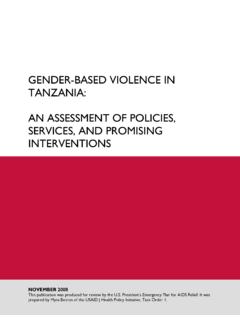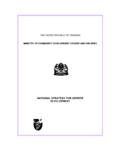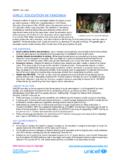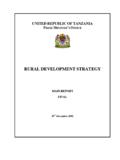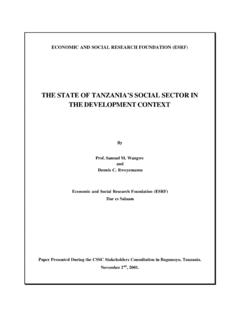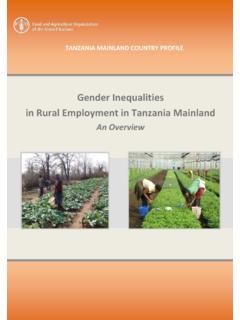Transcription of The Contribution of Civil Society Organizations ... - …
1 The Contribution of Civil Society Organizations (CSOs) to the Development of education in tanzania Dar es Salaam September 2009. 2. Table of Contents Acronyms .. 3. 4. Civil Society Organizations in tanzania .. 4. Roles of Civil Society Organizations (CSOs) .. 4. Roles of Civil Society Organizations in education .. 6. Method .. 8. Early Childhood education (ECD) .. 8. Ngorongoro Early Childhood Development (ECD) Programme (Oxfam GB, 2002-2009) .. 8. ECD Programme in Pastoralist Communities - .. 8. Primary 8. education Quality Improvement through Pedagogy (EQUIP) Programme in Shinyanga, tanzania (Binagi, 2008).
2 8. Achievements .. 9. Future plans .. 11. Sustainability .. 11. More districts in 11. Child-centred learning for all tanzania 's classrooms .. 11. Newspapers in education (NiE) Project by SNV and Guardian Newspaper (2009-2011).. 11. Friends of education Engagement .. 12. Secondary education .. 13. Youth Press Clubs (HakiElimu, 2009) .. 13. Achievements so far? .. 14. Adult and Non-Formal education .. 14. The Ngorongoro Pastoralist Programme .. 14. Why Ngorongoro? .. 14. Objectives .. 15. Findings .. 15. Conclusion .. 16. Recommendations .. 16. Teacher education .. 17. Research Activities .. 17. education Options for Pastoral Communities in Ngorongoro District.
3 17. The 18. Key findings .. 18. Conclusions and Recommendations .. 19. Key policy 19. Programme Recommendations .. 20. Boarding schools/facilities .. 20. Mobile Schools .. 21. Satellite schools (lower classes; 1-4) .. 21. Non-formal education .. 21. Distance education .. 21. Pre-school .. 22. Use of teacher assistants in standards 1 and 22. Developing Index for Inclusion in tanzania .. 23. Research Project Activities .. 23. Key Findings .. 23. Challenges .. 24. Lessons 24. Conclusions .. 25. Recommendations .. 25. 3. Acronyms AIDS Acquired Immunodeficiency Syndrome ANCEFA African Network Campaign on education for All BEDC Basic education Development Committee BERE Bureau for Educational Research and Evaluation CCNGO Collective Consultation of Non-Governmental Organizations COBET Complementary Basic education in tanzania CSOs Civil Society Organizations DPs Development Partners ECD Early Childhood Development EFA education for All ESDP education Sector Development Programme ESR education for Self Reliance ETP education and Training Policy FTI First Track Initiative GBS General Budget Support GDP Gross Domestic
4 Product HIV Human Immunodeficiency Virus JAST Joint Assistance Strategy MCDGC Ministry of Community Development, Gender and Children MDG Millennium Development Goals MKUKUTA Mkakati wa Kukuza Uchumi na Kupunguza Umaskini tanzania MoEVT Ministry of education and Vocational Training MoHSW Ministry of Health and Social Welfare NER Net Enrolment Rate NFE Non Formal education PEDP Primary education Development Plan SEDP Secondary education Development Plan TDMS Teacher Development and Management Strategy TEN/MET tanzania education Network/Mtandao wa Elimu tanzania TECDEN tanzania Early Childhood Development Network TRCs Teacher Resource Centres UNESCO United Nations Educational and Scientific Organization URT United
5 Republic of tanzania WFP World Food Programme 4. The Contribution of Civil Society Organizations (CSOs) to the Development of education in tanzania Introduction The purpose of this paper is to facilitate understanding by education stakeholders of the role of non- governmental Organizations (NGOs) and community based Organizations (CBOs) in the development of education in tanzania , It is hoped that this understanding would improve partnership between the Government, the private sector, and Civil Society and promote transparency and accountability among them. The understanding would also enable the international community and, specifically, development partners working in tanzania to monitor effective participation of Civil Society Organizations as provided for in such instruments as the Cotonou Agreement (EC, 2000) and to increase their support to these Organizations .
6 This understanding seeks to encourage public schools and other education institutions to work in partnership with Civil Society Organizations (CSOs), to appreciate the latter s role and Contribution to the development of education and to work better with government and other non-state actors to improving access to equity in and quality and management of education in rural and urban areas. However, given that it is not only NGOs and CBOs that contribute to educational development, the discussion has been broadened to include other Organizations , such as the media, faith based Organizations (FBOs), professional and research associations and, for tanzania , the Teachers Trade Union (TTU).
7 The generic name used to refer to all such Organizations is Civil Society Organizations . or CSOs. The main focus of this paper is the Contribution of CSOs in designing and implementing education innovations over the last five years. It begins with a historical perspective, analyzing the roles of CSOs, and finally focusing on examples of innovations, challenges, and recommendations. Civil Society Organizations in tanzania Apart from Faith Based Organizations (FBOs), which date back to colonial times, Civil Society Organizations (CSOs) in tanzania have a very short history. Kilemile (2005: 5) carried out a mapping study of CSOs.
8 The study found that CSOs started growing fast from 1990. TANGO (2002:11) shows that the number of CSOs grew rapidly from an estimated 400 by 1990 to 4,000 CSOs by 2002. This is an increase of ten fold in about 12 years. Fleming (1999:13) observes that between 1992 and 1994. the number of registered CSOs increased by an estimated 300%. Arguably, this rapid growth is attributed to global, political, and economic reforms initiated during that period and the need for establishing more liberal and democratic systems of governance in tanzania During the visit to education CSOs throughout the country in 2005, officials from the Ministry of education and Vocational Training (MoEVT) established that there were in that year more than 557.
9 Organizations working to improve education in tanzania (Majjid, 2006). As an example, tanzania education Network/Mtandao wa Elimu tanzania (TEN/MET), a membership umbrella organization, began with 39 members in 1999. Its membership is growing by the year. By June 2009, it had 260 Organizations in its database, but only 147 were voting members (TEN/MET, 2009), that is, they had paid their registration and annual subscription fees. Roles of Civil Society Organizations (CSOs). In this section an in-depth analysis is made of the expected roles of different stakeholders in development and education in particular, with a particular focus on Civil Society Organizations .
10 The mapping study (Kilemile, 2005) and the situational analysis of CSOs (Kilemile, 2006) indicated that CSOs were working in different developmental and social sectors and thematic areas, including: HIV/AIDS; CSOs capacity building and coordination (networks); good governance and democracy;. 5. social economic development; poverty alleviation; human rights and litigation; rural development;. education ; women development; media; science and technology; gender and equity; youth development; social welfare and health . Thus education is only one of those sectors that CSOs are engaged in nationally. Historically, the role of the CSOs in tanzania has evolved through two main phases: a service delivery phase (from the pre-independence era to early 1990s) during which CSO.
